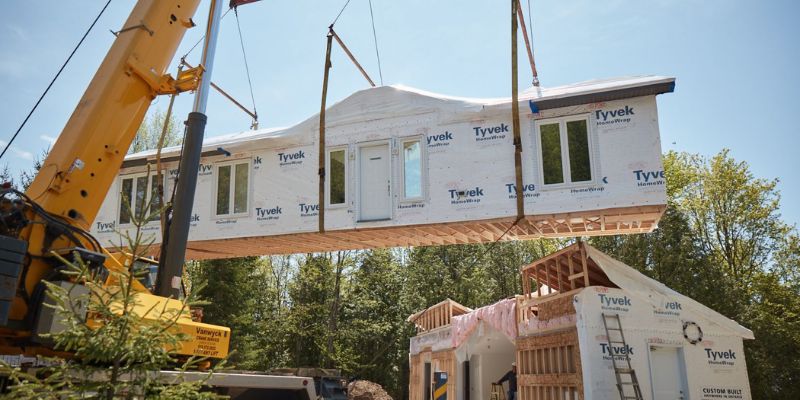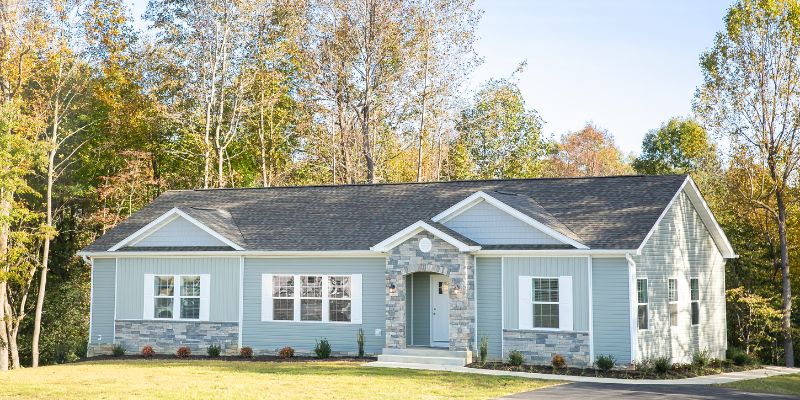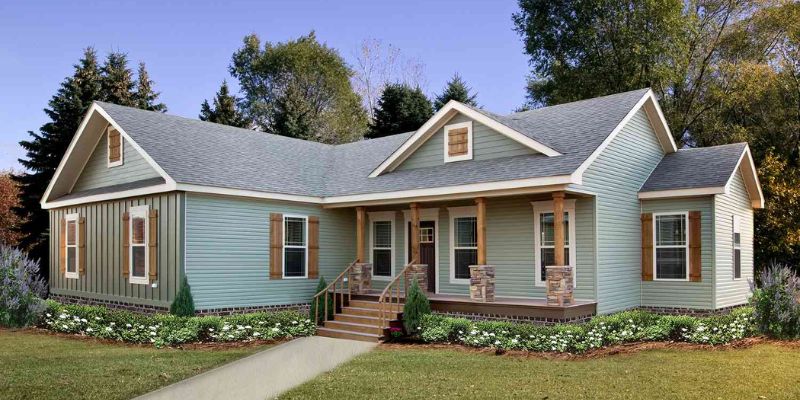Are you looking for an alternative solution to building a home? Have you considered the unique advantages of modular homes? Modular homes provide homeowners with increased affordability, faster construction times, and greater end-to-end design control.
But what is a modular home exactly, and is it right for you? In this blog post, we dive into the world of modular housing to give you all the information needed to help you decide if a modular option could be right for your needs.
Modular home
A modular home is a prefabricated home built off-site in a factory setting and then transported to the final location for assembly and installation. It is constructed in modules or sections, hence the term "modular."
Here are some key characteristics of modular homes:
Construction Process
Modular homes are built in a controlled factory environment, where each module is constructed separately. Skilled workers assemble the modules using precise measurements and quality control standards. This off-site construction allows for more efficient and consistent building practices.
Customization
Modular homes offer a range of customization options. Buyers can choose from various floor plans, architectural styles, finishes, and amenities to suit their preferences and needs. The modular construction process allows for flexibility in design, with the ability to add or remove modules as required.
Building Codes and Standards
Modular homes are constructed in compliance with local and national building codes and regulations. They undergo inspections during factory construction to ensure safety and quality standards adherence.
Transportation and Installation
Once the modules are completed in the factory, they are transported to the final site. This can involve transporting the modules on trucks or trailers. A crane or other equipment lifts and positions the modules onto a foundation at the destination.
The modules are then secured and joined together to create a complete home.
Affordability and Efficiency
Modular homes are often considered more affordable compared to traditional site-built homes. The controlled factory environment reduces construction time, minimizes material waste, and saves costs. Additionally, the assembly process on-site is typically faster, reducing labor costs.
Quality and Durability
Modular homes are subject to rigorous quality control processes during construction. The factory setting allows for precise construction techniques and consistent standards, resulting in well-built and durable homes.
Modular houses vs. manufactured and mobile homes

It is important to note the difference between modular, manufactured, and mobile homes.
Manufactured and mobile homes are built in factories but are not subject to the same building codes as modular homes. They often have a shorter life span due to their lack of durability and quality construction standards.
Modular houses, on the other hand, are built with higher-quality materials and constructed in compliance with building codes. This ensures they are safe, durable, and designed to last for many years.
Modular homes offer the convenience of factory-built construction with the flexibility to customize and design a home according to individual preferences. They provide an efficient way to build a quality home at an affordable price.
Pros of Modular Homes
Cost Savings
Modular homes are often more affordable than site-built homes due to the controlled factory environment, streamlined construction processes, and bulk purchasing of materials. They can provide cost savings regarding construction time, labor, and potential material waste reduction.
Customization
Modular homes offer a range of customization options. Buyers can choose from various floor plans, architectural styles, finishes, and amenities to suit their preferences and needs. The modular construction process allows for flexibility in design, with the ability to add or remove modules as required.
Quality Construction
Modular homes are constructed in a controlled factory environment, where each module undergoes rigorous quality control inspections. This results in well-built and durable homes that meet local and national building codes.
Faster Construction
Since modular homes are built concurrently in a factory setting, the construction process is typically faster than traditional site-built homes. This can save time and reduce the overall project timeline.
Energy Efficiency
Modular homes often incorporate energy-efficient features and materials. The controlled construction environment allows for better insulation, tighter construction seals, and the integration of energy-saving technologies. This can lead to lower energy consumption and reduced utility costs.
Reduced On-Site Disruption
Most of the construction work for modular homes is completed in the factory. This can minimize disruptions to the final site, such as noise, dust, and traffic, which can be particularly beneficial in residential neighborhoods.
Cons of Modular Homes

Land and Zoning Limitations
Finding suitable land and navigating zoning restrictions can challenge modular home placement. Some areas may have specific regulations or restrictions that limit where modular homes can be installed.
Transportation and Site Preparation
Transporting the modular home sections to the final site requires careful coordination and may incur additional costs. Site preparation, including the foundation and utility connections, must be properly handled to ensure a smooth installation process.
Limited Design Flexibility
While modular homes offer customization options, there may be some limitations compared to site-built homes. The design and size of the modules need to adhere to transportation regulations and factory construction requirements, which may restrict certain design elements.
Financing and Insurance
Some lenders and insurers may have specific requirements or limitations for modular homes, which can create challenges in obtaining financing and insurance coverage. Working with lenders and insurers experienced in modular home financing, and insurance is important.
Resale Value
While modular homes typically appreciate, they may appreciate less than site-built homes in some real estate markets. Location, market demand, and the perception of modular homes in the local market can influence resale value.
Modular homes offer a cost-effective, customizable, and efficient housing option. However, it's important to carefully consider factors such as land availability, local regulations, financing options, and personal preferences before deciding if a modular home is the right choice for you.
Consulting with modular home manufacturers, builders, and local professionals can provide valuable guidance tailored to your circumstances.
How much does a modular home cost
The cost of a modular home depends on the size, design, location, and other factors. Generally speaking, they are typically more affordable than site-built homes due to their efficient construction process and bulk purchasing of materials.
On average, costs can range from $50 to $75 per square foot for a basic model, excluding land and installation costs.
FAQs
How do you buy a modular home?
Buying a modular home is much like buying any other kind of home. You will need to research financing options, find an experienced builder, and determine the size and features of your desired home before purchasing.
Where is the best place to put a modular home?
Modular homes can be placed on many types of foundations. The most common foundation type is a concrete block wall, but other options may include a full basement or crawl space. Speaking with your builder about what type of foundation would best suit your needs and location is important.
What is modular material?
Modular material is any material used in the construction of a modular home. This includes lumber, nails, siding, roofing materials, insulation, and other prefabricated or off-site components constructed and delivered to the building site.
Conclusion
Modular homes offer a unique and advantageous alternative to traditional construction. From their affordability to faster build times, these pre-fabricated structures can be the perfect solution for those seeking a convenient and economical home-building option.
With so many positive features, including increased sustainability practices in production, it's no wonder they are gaining traction as an affordable and quality housing choice. And remember: if you have any questions about what is a modular home or how they differ from traditional construction methods—you can always reach out for help!




